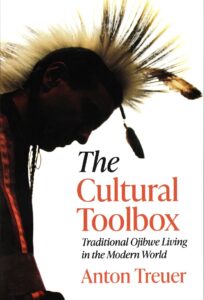Book review: The Cultural Toolbox: Traditional Ojibwe Living in the Modern World
 Reviewed by Karl Hele
Reviewed by Karl Hele
Anton Treuer’s The Cultural Toolbox: Traditional Ojibwe Living in the Modern World is an incredibly well-written narrative introduction into Ojibwe cultural teachings and their saliency in the contemporary world. Treuer draws upon his knowledge from a life lived on the Red Road, Anishinaabemowin, and lessons from numerous Anishinaabeg Elders to create this text.
Throughout Cultural Toolbox, the author is protective of Anishinaabeg teachings. By only revealing enough information through personal stories and lessons, Treuer enables Indigenous readers to begin or enrich their own journey while providing outsiders with enough information to grasp the depth of our cultural teachings. This is Treuer’s vision behind the work – he wanted to create a text that people could access and use as a guide in building their own cultural toolkits while encouraging engagement with Elders and Knowledge Keepers.
Treuer’s Cultural Toolbox is structured by the four seasons – spring, summer, fall, and winter – neatly sandwiched between an introduction and conclusion. In each chapter, Treuer follows specific themes relating to ceremony, life’s journey (new life, coming of age, adulthood, and elderhood), spirits, stories, gender roles, and lessons. This is seamlessly blended with personal stories drawing from his life’s experience in learning and practising Anishinaabeg teachings while raising children.
Throughout the chapters, Treuer notes that our culture is continually changing or adapting to the world in which we live – we are part of the world, existing within it, in all its forms, experiences, and technology. While our core values, such as respecting all forms of life, remain, it is how we are able to practice and express the teachings that change. He also informs the readers of the cultural variations across Anishinaabeg country in how ceremony is performed – for instance, in some communities, apples are banned from traditional feasts in an effort to avoid cross-contamination with Christian ideas. Treuer’s personal stories, that are blended with Anishinaabeg teachings, offer a readable, understandable, and enjoyable text.
I found Treuer’s work particularly powerful when he speaks of the need to share while protecting our teachings as well as how he shows the relevancy of Anishinaabeg teachings in the contemporary world through personal stories. Utilizing the medium of print offers diasporic Anishinaabeg people a means to access cultural teachings. Yet, as he stresses, the book’s content is meant as an introduction to begin the process of building a cultural toolkit.
This is a wonderful book from a key Knowledge Keeper (and sharer) who is keenly aware of the need to care for and engage with our culture wherever we live. Even ‘little’ things like offering tobacco before harvesting from a backyard garden or tapping a couple of maple trees in the backyard, bring us as Anishinaabeg into contact and engagement with core teachings. I highly recommend that those beginning or already living the Anishisinaabeg road, and those interested in learning about our culture, read The Cultural Toolbox. Knowledge brings understanding, understanding brings respect, and both help all of us live together as human beings.
Anton Treuer, The Cultural Toolbox: Traditional Ojibwe Living in the Modern World. St. Paul: Minnesota Historical Society Press, 2021.
ISBN: 1681342146


